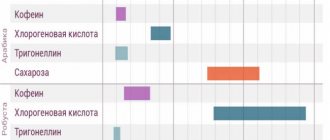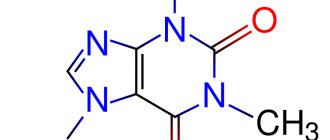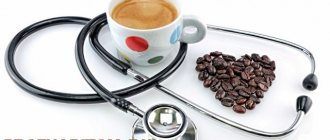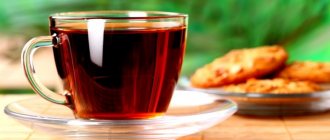Caffeine causes insomnia
It is immediately worth noting that caffeine has an invigorating effect. However, its action lasts for 3-4 hours. To be sure that caffeine does not interfere with your sleep, it is enough not to drink coffee 5-6 hours before bed. Insomnia from caffeine is only possible if a person is hypersensitive to it. By the way, we previously collected 7 plants for you that will help you get a good night's sleep. To get a good night's sleep, you need to know that many of our knowledge are myths that can harm our sleep. That's why we suggest reading about the 10 most popular myths about sleep. We recommend!
Why do we drink coffee?
What does the phrase “Maybe for coffee?” mean to us? For some, it’s just an excuse to take a break, others savor the taste of the drink, but more often we drink coffee to cheer ourselves up. This is one of the most affordable energy drinks, so despite periodic calls to limit caffeine consumption, we don’t even think about giving it up.
Caffeine, an alkaloid that has a stimulating effect on the nervous system, is responsible for the tonic effect of coffee. Our breathing quickens, metabolism and blood circulation accelerate. But few coffee lovers pay attention to the fact that caffeine is also found in tea leaves, cocoa, mate, guarana, cola nuts and other plants. Caffeine-containing flora synthesize the substance both to protect against insects and to encourage pollinators. In this regard, the effects of caffeine on humans are almost the same as its effects on insects: it stimulates the brain at low doses and is toxic at high doses.
Coffee helps you lose weight
This myth is quite popular and has some truth to it. Indeed, coffee speeds up metabolism, but only at the initial stage. When you start drinking coffee regularly, your body will get used to it and no accelerated metabolism will occur.
We hope you enjoyed the coffee myths we collected. There are a huge number of types of coffee in the world and we talked about one of them. We invite you to get acquainted with one of the most expensive coffees on the planet - kopi luwak. In the article we explained how it is produced and why it is expensive.
Myths about coffee
There are many myths about this amazing invigorating drink that are easily refuted:
- There are no caffeine fractions in decaf coffee. In fact, they are contained, but in very small quantities.
- Espresso is a special type of bean . A rich, invigorating drink can be obtained by passing water through the grains under high pressure. You can make espresso from any beans, regardless of the type.
- Coffee drink helps with hangover . It will not be possible to improve your well-being this way. This is due to the fact that alcohol causes dehydration and provokes the appearance of hangover symptoms. An invigorating drink will worsen the situation. To restore your water balance, it is recommended to drink as much regular water as possible.
- Green grains help reduce weight . This is a common myth about green coffee. Experiments conducted on mice showed the opposite. This drink often leads to obesity. In addition, there are many contraindications to its use.
- Coffee leads to insomnia. If you drink it at lunch, there will be no sleep disturbances. It is noted that it takes about eight hours to remove caffeine from the body.
- The stronger the roast, the greater the caffeine concentration . On the contrary, caffeine fractions are partially destroyed during roasting. Their concentration depends on the time of grain collection and the variety.
- The best place to store grains is the refrigerator. This environment is far from suitable. The condensation process and low temperatures lead to a loss of aromatic qualities.
- Caffeine leads to the development of heart disease . It has been proven that this substance does not have an effect on the dynamics of heart disease. On the contrary, when drinking a cup of aromatic drink a day, the condition of the organ improves.
Coffee is an amazing drink that can have a positive effect on the body. It has a lot of beneficial properties, but only if a certain dosage is observed. Abuse of an aromatic and invigorating drink leads to negative changes. Knowing the whole truth about it, you will be able to choose the right variety, enjoy the extraordinary taste and take care of your health.
Coffee is addictive
Caffeine stimulates the central nervous system and can actually be mildly addictive. But the withdrawal effect does not last long, literally one to two days.
Scientists from Chicago and Maryland claim that even those people who abuse coffee live longer than those who do not drink it at all. According to the latest research, this drink has more pros than cons. Coffee, of course, will not make us superhuman, but this is not a reason to deprive ourselves of the pleasure of pampering ourselves with a cup of our favorite drink, just because there are rumors about its dangers. A truth as old as time: everything is good in moderation.
Coffee collection Cantata
Myth #5 – Coffee helps you get rid of a hangover
Many people think that since coffee has such an invigorating effect, it will also help get rid of a hangover. In fact, yes, coffee will help cheer you up even with a hangover, but only a few know about its diuretic effect. Coffee, being a drink with a pronounced diuretic effect, will only contribute to dehydration, which already exists with a hangover.
Therefore, if you really need to cheer up with a hangover, it is better to give preference to strong sweet tea.
Coffee sobers up
0
Source:
Coffee won't help you sober up quickly. Research shows that mixing caffeine and alcohol is dangerous. A cup of coffee after drinking alcohol disrupts the drinker’s judgment, and he begins to think that he has already sobered up. In fact, caffeine simply slows down the feeling of intoxication, keeps you alert, so the person continues to drink. Therefore, even greater intoxication of the body occurs.
Then what kind of coffee should you drink?
/www.iphones.ru/wp-content/uploads/2015/10/0113-200×130.jpg" target="_blank">https://www.iphones.ru/wp-content/uploads/2015/10 /0113-200×130.jpg 200w,
334w, 107w" style="width: 500px; height: 327px;" />
We only get the caffeine effect from whole bean coffee. After this, we must be prepared for the onset of the theobromine phase - the opposite effect.
The theobromine stage occurs when drinking any type of coffee, no matter what quality.
Some varieties maintain the “caffeine stage” for up to 30 minutes. But then you still get the theobromine stage. Its duration is much longer, about 60-70 minutes.
Everyone can feel this for themselves. The phase of activation and surge of energy feels good, after which you want to relax a little.
Therefore, it is important to remember: by drinking plain water at the right time, the stage of the negative effect is reduced. You prevent deterioration of renal blood flow.
Therefore, now knowing the mechanism of action of coffee, make it a rule: always drink water after a cup of coffee. Your kidneys will thank you!
Myth #9: Tea has more caffeine than coffee.
Oddly enough, the fact that tea has more caffeine than coffee is not a myth, but the truth, but with some reservation. As a percentage, tea leaves actually contain more caffeine than the same amount of coffee beans by weight. But the fact is that when preparing one serving of coffee in almost any way, much more coffee beans are used than leaves when brewing tea.
Therefore, if you brew a cup of tea using 8 grams of coffee and a cup of tea using the same weight of tea, you will get much more caffeine in the cup of tea. Of course, the methods of preparing both drinks, brewing time and other factors will be of great importance here. But, nevertheless, 8 grams of coffee is a standard portion for espresso or Turkish coffee, while 8 grams of tea is three heaped teaspoons, which in terms of one cup of tea will exceed the “standard” at least three times.
Myth No. 10 - Coffee is “he”, if it’s a drink, and if it’s a plant, then it’s “it”
Disputes and discussions about the correct use of the word “coffee” in Russian have been going on for many years. Some believe that in the masculine gender coffee is pronounced only when a coffee drink is implied, for example: “Thank you, your coffee was very tasty.” And if we are talking about coffee as a plant, then this word is used in the neuter gender, for example: “We grow good coffee.”
Both of these opinions are wrong.
It is generally accepted that the word “coffee” is a variant of the word “coffee” (or “coffee”), distorted over time, as it was called when it was first brought to Russia. Over time, “coffee” became “coffee,” but even though pronouncing “coffee” as “it” seems more logical, it remained in the masculine gender. Modern rules and norms of the Russian language clearly indicate the only correct pronunciation of the word “coffee” as an indeclinable masculine word. And this does not depend on what is meant: the coffee tree, the bean or the finished drink.
This is also interesting:
- Can a nursing mother have coffee? It is very difficult to give up habits that have developed over the years. One such habit is drinking coffee. Coffee has an excellent tonic effect on the body and many people no longer […]
- Does coffee raise or lower blood pressure? Coffee is a very common drink and its effect on the body has been well studied. It would be more accurate to say that the influence is not of the drink as such, but of the biologically active substances contained in it [...]
- How to Roast Green Coffee Some coffee lovers prefer to roast their own green coffee, adjusting the roast level to their liking. The procedure for roasting green coffee is not a complicated process, you just need to follow [...]
- Coffee: To drink or not to drink Being one of the most vital drinks, coffee attracts a lot of attention. Including the effects of coffee on health. And when deciding whether to drink coffee, many people look […]
Negative effects of coffee on the human body
“Coffee is a very personal drink.
It, like cognac, cannot be drunk in mugs! Winston Churchill
So, let's look at the negative side effects of drinking coffee.
Caffeine increases blood pressure
Research shows that coffee may be beneficial when you consume less than 400 mg of caffeine per day. Negative effects tend to occur when a person drinks more than this.
However, the amount of caffeine in coffee can vary greatly. For example, an Americano cup contains from 75 to 300 mg of caffeine , depending on the size.
If you brew your coffee at home, the caffeine content will vary depending on the type of coffee and brewing method.
In addition, instant coffee usually contains less caffeine.
Keep in mind that everyone metabolizes caffeine differently, and some people find it “easy” to overdose. This is precisely the reason why you should not give coffee to young children.
So, the harm of drinking coffee and caffeine is that it can sharply increase blood pressure - both diastolic and systolic. This effect usually lasts for 3-6 hours (with a peak 1-2 hours after drinking coffee).
Interestingly, caffeine has no effect on the acute increase in blood pressure in heavy coffee drinkers. This is thought to be because they develop a tolerance to the effects of caffeine, which increases blood pressure.
Can coffee cause hypertension?
If the effect of coffee on blood vessels can increase blood pressure, could this lead to hypertension?
It seems the answer to this question is no. A review of studies on this topic did not show a direct relationship between coffee consumption and hypertension.
Important: Coffee may increase your blood pressure—at least in the short term.
Coffee causes insomnia
Another disadvantage of drinking coffee is that it interferes with healthy sleep.
Of course, some people can drink coffee right before bed and sleep soundly. Once again, the reason for this is that everyone metabolizes coffee (and caffeine) differently : some faster, some slower.
Caffeine has a long half-life. On average it is about 5-6 hours for healthy people, but it can be higher depending on the health of the liver and a number of other factors.
Therefore, if you drink coffee in the evening, it can harm your circadian rhythm. Research confirms that high caffeine consumption is associated with a higher risk of insomnia.
In addition, if you drink coffee within 6 hours before bed, it will affect not only the duration of your sleep, but also its quality.
Important: Drinking coffee late at night causes insomnia.
Abrupt caffeine withdrawal leads to headaches
In fact, caffeine is a drug , and if you suddenly quit it, withdrawal occurs.
First of all, it manifests itself as migraines, which go away if a person starts consuming caffeine again.
One interesting experiment looked at people's blood flow during the first days of caffeine abstinence. Scientists have proven that stopping caffeine consumption reduces electrical activity in the brain and increases blood flow.
This explains side effects such as headaches, fatigue and lethargy.
How long does this effect last?
Typically, withdrawal symptoms peak after 1-2 days of caffeine abstinence and can last up to 1-2 weeks.
Important: coffee is a drug, and quitting it provokes unpleasant symptoms.
Coffee worsens acid reflux and heartburn symptoms
Acid reflux and gastroesophageal reflux disease (GERD) are extremely unpleasant diseases.
There are various theories about what causes them, but the fact is that certain foods and drinks make these diseases worse.
Unfortunately, coffee is one of them. People often suffer from heartburn after drinking coffee.
Research shows that coffee can weaken the lower esophageal sphincter, the valve that separates the esophagus and stomach.
Important: Coffee can cause acid reflux and heartburn.
Caffeine causes anxiety and panic attacks
Coffee and caffeine have a negative effect on people prone to anxiety and depression.
In one of the illustrative experiments, scientists studied the behavior of 98 people after drinking coffee.
72 participants initially suffered from panic disorder and social anxiety. 26 were mentally healthy.
After taking 480 mg of caffeine, 31 of 72 patients with mental problems had a panic attack. 26 healthy participants showed no symptoms.
A week later, a second test was carried out. All participants were given a placebo instead of coffee. No one showed any symptoms.
It is clear that caffeine can cause panic attacks and severe anxiety in those at risk.
Important: Some people may experience anxiety and fear when consuming large amounts of caffeine.
Coffee increases the risk of miscarriage during pregnancy
Many expectant mothers need to avoid coffee. During pregnancy, its harm is especially felt.
Over the past few years, there have been several large-scale studies of the effects of caffeine on pregnancy. Here are the main points:
- There is a direct link between excessive caffeine consumption and miscarriage;
- Maximum dose for pregnant women: 2-3 cups of coffee per day (200 – 300 mg of caffeine);
- The risk of having a premature baby increases linearly with caffeine consumption.
Overall, the evidence suggests that small amounts of caffeine (1 or 2 cups of coffee per day) are an “acceptable” risk.
However, since complications occur in a dose-dependent manner, it may be best to avoid coffee completely during pregnancy.
Important: Caffeine consumption increases the risk of pregnancy complications.
Coffee May Contribute to IBS and Other Digestive Problems
Irritable bowel syndrome (IBS) is a global problem for modern people. Its prevalence among the population of developed countries is estimated to be 10-20%.
Patients with IBS often suffer from side effects after consuming many foods, including coffee.
What is the harm of coffee for the stomach and digestion?
People with IBS complain of bloating and heartburn after drinking coffee (especially on an empty stomach).
This is due to the fact that coffee increases the motility of the colon and also stimulates the secretion of stomach acid.
Important: Coffee can aggravate IBS and other gastrointestinal diseases.
8. Some coffee drinks contain large amounts of sugar and fat.
Although a cup of coffee may provide some relief, it will quickly disappear if the coffee is loaded with sugar.
Some coffee drinks in stores and cafes contain up to 60 grams ( 15 teaspoons ) of sugar.
Additionally, some types of coffee may contain excessive amounts of fat and calories.
While there's nothing wrong with adding a little cream (or butter, if you prefer) to your coffee, eating liquid fats isn't conducive to good health.
Important: for less harm, you should choose black coffee or latte and avoid coffee drinks with a lot of sugar or fat.
Caffeine is a strong allergen
Finally, there are people who physically cannot tolerate coffee.
Those who are allergic to coffee experience adverse reactions and serious symptoms, including anaphylaxis, soon after drinking it.
Some people cannot digest caffeine and it has a much stronger effect on their body. Especially when consuming large quantities of coffee over a short period.
Some of the symptoms of a coffee allergy are:
- Shiver;
- Cardiopalmus;
- Dizziness;
- Shortness of breath or a feeling of tightness in the chest.
Secrets of instant coffee
/www.iphones.ru/wp-content/uploads/2015/10/0073-200×145.jpg" target="_blank">https://www.iphones.ru/wp-content/uploads/2015/10 /0073-200×145.jpg 200w,
334w, 107w" style="width: 500px; height: 363px;" />
When the caffeine fraction is extracted from coffee, the outer shell of the grain is removed. This part goes to medications, caffeine and caffeine-containing drinks (for example, citramon, energy drinks, and so on).
The inner shell of the grain is used to produce instant and granulated coffee.
An interesting fact that makes you think. The Americans are trying to push through a law so that all cans of granulated coffee are labeled “decaffeinated coffee.” Some manufacturers are already writing.
In fact, any granulated or instant coffee contains from 5% to 10% caffeine fractions. As a rule, you do not feel any invigorating effect, blood pressure does not increase, and after this coffee you want to sleep.
You should drink instant coffee in the evening (closer to the night) - you will sleep better. That's the whole effect.
Myth No. 6 - Truly proper coffee is only brewed in a Turk
There really is no right or wrong way to make coffee. Turkish coffee is no worse than espresso and no better than filter coffee - it's just different. Just like strawberries are no better than raspberries and no worse than blackberries. Every person prefers one type of cooking to another and has every right to do so. If you prefer espresso, then there is no point in judging those who prefer to brew coffee, for example, in a French press.
The only thing that is true is that coffee can be prepared poorly and from low-quality raw materials, and the method of preparation does not matter.
Myth No. 2 – A cup of morning coffee gives you a boost of energy for the whole day.
Of course, the energizing effect of caffeine is not a myth. A cup of strong natural coffee in the morning really helps you wake up, but the idea that it will provide a boost of energy for the whole next day is a misconception.
The thing is that the effect of caffeine lasts much less than many people think. After drinking a cup of coffee, a person feels cheerful almost immediately, but after 30-40 minutes the effect of caffeine ends, and the feeling of cheerfulness is replaced by relaxation and drowsiness. It is precisely because of this effect that it is not recommended to drink coffee while driving on a long trip.
Myth three. Coffee promotes a cheerful mood
This statement is partially true, since each person perceives this drink differently. Caffeine has the unique property of suppressing the inhibitory effect of brain receptors. In other words, this substance prevents the brain from slowing down.
The work of the liver is also of considerable importance in the manifestation of the effect of vigor. The weaker the liver enzymes are, the slower they break down the coffee, and more caffeine begins to enter the brain. This explains the fact that people perceive the effect of coffee differently: for some it has an invigorating effect, for others it does not.
In this case, the type of drink that is prepared is also important: from ground grains or instant. Since coffee made from ground beans contains chemicals contained in the casing, the dose of caffeine and other active substances in such a drink is much greater. There are much fewer active substances in an instant drink. Therefore, most people, after drinking a cup of instant coffee, feel lethargic and drowsy.











